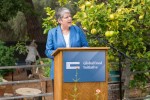On Tuesday morning, University of California President Janet Napolitano announced her own UC initiative to address global hunger, saying that the UC plays a big role in addressing global food issues through research.
“It is to do all we can to help the world learn to feed itself in ways that are healthy and sustainable,” Napolitano said in a press release.
Napolitano wants to address the issue because food security has been and will become a more pressing issue as the world population grows, said UC spokesman Steve Montiel, who made the trip with Napolitano to UCLA on Tuesday afternoon.
As part of the initiative, the UC will fund three $2,500 President’s Global Food Initiative Student Fellowships on each campus for student research projects or internships related to food issues.
Napolitano said she will encourage faculty to research and integrate food issues, such as sustainability, into more undergraduate and graduate courses. The UC will also push for campuses to promote sustainable farming practices.
She also urged campuses to purchase more of their food from local, small growers and to work together to have a greater influence on agricultural companies, Montiel said.
“If you take what UCLA is doing and multiply it by 10 (campuses), you can get an idea of how big of an impact this initiative will have,” Napolitano said.
Napolitano praised the UCLA Healthy Campus Initiative for drawing various members of the campus community in developing a more sustainable and healthy campus. The initiative, launched in 2013 and funded by private donors, has given grants to several student groups whose projects promote sustainability and seek to offer healthier dining options for students.
For instance, Bruin Plate, a residential dining hall created in 2013 that supports the Healthy Campus Initiative, has sponsored “meet the farmers” events where students are able to speak to the farmers who supplied food for the dining hall. Bruin Plate has also offered food from more local suppliers.
According to its sustainability report for the 2012-2013 fiscal year, the UC spent about 19.5 percent of total annual food expenditures on sustainable food, almost meeting the UC’s goal to spend 20 percent on sustainable food by 2020. Ten percent of the food purchased by UCLA’s residential dining services and 25 percent of the food purchased by the UCLA Health System was sustainable.
Wendy Slusser, associate vice provost for the Healthy Campus Initiative, said she will chair several working groups with different focus areas, such as the development of healthier vending machine options or partnerships with K-12 schools to share UCLA’s progress and learn from other models.
Bob Knight, a farmer from Redlands who supplies produce for UCLA, said he hopes the initiative will reshape the way people eat, since people have lost appreciation for their food as they forget where it comes from.
Ian Davies, a coordinator at DigUCLA, which developed a garden in Sunset Canyon Recreation Center, said he hopes the new initiative will include specific funding plans for research and clear pathways for students to become involved and voice their opinions.
“Even when students have great ideas, there isn’t any avenue for students’ voice to heard,” said Davies, a fourth-year environmental science student.
Napolitano has announced several initiatives focusing on issues larger than the UC throughout her year as president. In November, she created an initiative to make the UC a zero net energy consumer and in January, she announced an initiative for the UC to cut its per capita water use by 20 percent by 2020, amid the state’s ongoing drought.
Napolitano said she wants the UC to be a good steward for the environment because the University has a significant impact on California and the state’s economy.
